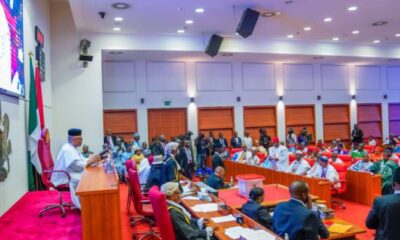National Issues
Youth Empowerment and the Future of Democracy in Nigeria: A 2024 Perspective -By Bridget Elijah
Technology and social media have played a transformative role in youth empowerment and political participation in Nigeria. Platforms like Twitter, Facebook, and Instagram have become powerful tools for organizing, mobilizing, and advocating for change. Social media campaigns can rapidly raise awareness of issues, gather support, and hold leaders accountable.

One of the most significant changes in Nigeria’s democratic landscape is the increased political participation of young people. The introduction of the Not Too Young To Run Act in 2018, which lowered the age requirements for running for office, has empowered a new generation of candidates. By 2024, this legislation has borne fruit, with numerous young Nigerians successfully running for and winning political offices at various levels.
Nigeria, Africa’s most populous nation and one of its largest economies, has been undergoing significant political and social transformations. At the heart of these changes is the growing involvement of its youth. As of 2024, the role of Nigeria’s younger generation in shaping the future of the country’s democracy has become increasingly prominent. This article explores how youth empowerment is influencing democratic processes, the challenges that persist, and the potential trajectory for Nigeria’s democratic future.
The Rise of Youth Activism
In recent years, Nigerian youth have emerged as a powerful force in the country’s political landscape. The EndSARS protests of 2020 marked a watershed moment, showcasing the ability of young Nigerians to mobilize, advocate for change, and demand accountability from their leaders. This movement, initially focused on police brutality, quickly evolved into a broader call for systemic reforms, highlighting the frustrations and aspirations of a generation seeking to reclaim their future.
The aftermath of the EndSARS protests saw a surge in youth engagement in political processes. Young Nigerians began to organize more effectively, participate in discussions on governance, and demand a greater voice in political decisions. By 2024, this trend has continued to gain momentum, with a new wave of political leaders, activists, and entrepreneurs emerging from the youth demographic.
This increased representation has brought fresh perspectives and innovative ideas to Nigerian politics. Young politicians are often more attuned to the concerns of their peers, including unemployment, education, and technology. Their presence in the political arena has the potential to drive progressive policies and foster a more inclusive and responsive government.
Challenges and Obstacles
Despite these advancements, several challenges remain. One of the primary issues is the persistence of systemic corruption and entrenched political interests that often undermine democratic processes. Young politicians, while enthusiastic and innovative, must navigate a complex and often hostile political environment that can stymie efforts for reform.
Additionally, there is the challenge of ensuring that youth activism translates into sustained political engagement. The initial surge of enthusiasm following movements like EndSARS needs to be maintained through continuous and meaningful involvement in the political process. This includes not only participating in elections but also engaging in policy discussions, advocacy, and community service.
Educational and Economic Empowerment
Education and economic opportunities are critical factors in empowering Nigeria’s youth. The government’s efforts to improve educational infrastructure and increase access to higher education are essential for equipping young people with the skills needed to contribute effectively to the democratic process. However, there is still a significant gap in access to quality education, particularly in rural areas.
Economic empowerment is equally important. Many young Nigerians face high levels of unemployment and underemployment. Initiatives aimed at fostering entrepreneurship, vocational training, and job creation are crucial for providing young people with viable career paths and reducing economic disenfranchisement. Economic stability can enhance political engagement by allowing youth to participate more fully in democratic processes without the constraints of financial insecurity.
The Role of Technology and Social Media
Technology and social media have played a transformative role in youth empowerment and political participation in Nigeria. Platforms like Twitter, Facebook, and Instagram have become powerful tools for organizing, mobilizing, and advocating for change. Social media campaigns can rapidly raise awareness of issues, gather support, and hold leaders accountable.
However, the digital landscape also presents challenges, such as misinformation, cyber bullying, and digital surveillance. Ensuring that young people can navigate these challenges while using technology as a tool for positive change is an ongoing task. Digital literacy programs and robust cyber security measures are essential for safeguarding the integrity of online activism and communication.










